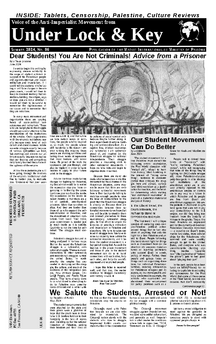
The Health Effects of Solitary Confinement
The author Charles Dickens (in American Notes for General Circulation)
wrote these words about solitary confinement in 1842:
“I believe that
very few men are capable of estimating the immense amount of torture and
agony which this dreadful punishment, prolonged for years, inflicts upon
the sufferers, and in guessing at it myself, and in reasoning from what
I have seen written upon their faces, and what to my certain knowledge
they feel within, I am only the more convinced that there is a depth of
terrible endurance in it which none but the sufferers themselves can
fathom, and which no man has a right to inflict upon his fellow
creature. I hold this slow and daily tampering with the mysteries of the
brain to be immeasurably worse than any torture of the body, and because
its ghastly signs and tokens are not so palpable to the eye and sense of
touch as scars upon the flesh, because it’s wounds are not upon the
surface, and it extorts few cries that human ears can hear, therefore
the more I denounce it.”
Upon reading a study on solitary confinement I reflect on the following effects of this legalized tool of torture.
Significant decrease in the ability of the nervous system functions:
-
Significant disruptions in hormone levels
-
Absence of menstruation in women with no other physiological, organic
cause due to age or pregnancy (secondary amenorrhea)
-
Increased feeling of having to eat: Zynorexia/cravings, hyporerexia,
compulsive overeating
-
In contrast, reduction or absence of thirst
-
Severe hot flashes and/or sensations of coldness not attributable to any
corresponding change in the ambient temperature or to illness (fever,
chills, etc.)
Significantly impaired perception and cognitive ability
-
Serious inability to process perceptions
-
Serious inability to feel one’s own body
-
Serious general difficulties in concentrating
-
Serious difficulty, even the complete inability, to read or register
what has been read, comprehend it and place it within a meaningful
context
-
Serious difficulties, even the complete inability, to speak or process
thoughts in written form (agraphia, dysgraphia)
-
Serious difficulties in articulating and verbalizing thoughts, which is
demonstrated in problems with syntax, grammar and word selection and can
even extend to aphasia, aphrasia, and agnosia
-
Serious difficulties or the complete inability to follow conversations
(shown to be the result of slowed function in the primary acoustic
cortex of the temporal lobes due to lack of stimulation)
Additional limitations
-
Carrying out conversations with oneself to compensate for the social and
acoustic lack of stimulation
-
Clear loss of intensity of feeling
-
Situatively euphoric feelings which later transform into a depressed
mood
Long-Term health consequences
-
Difficulties in social contacts, including the inability to engage in
emotionally close and long-term romantic relationships
-
Depression
-
Negative impact on self-esteem
-
Returning to imprisonment situation in dreams
-
Blood pressure disorders requiring treatment
-
Skin disorders requiring treatment
-
Inability to recover in particular cognitive skills (e.g. in
mathematics) the prisoner had mastered before solitary confinement








